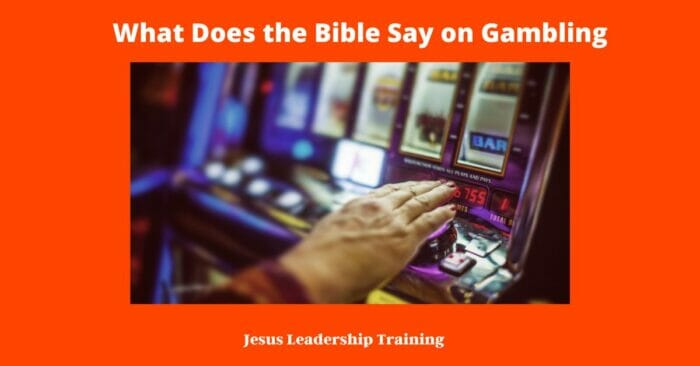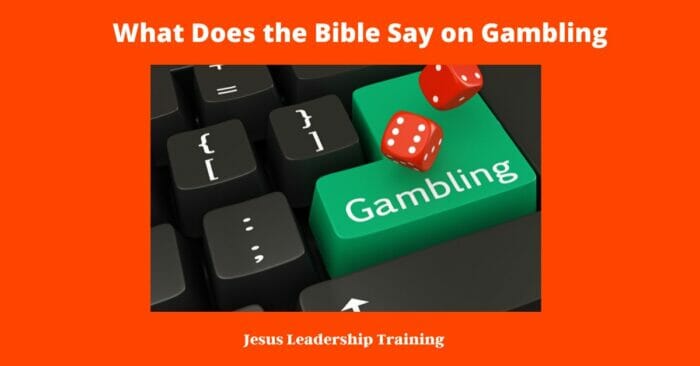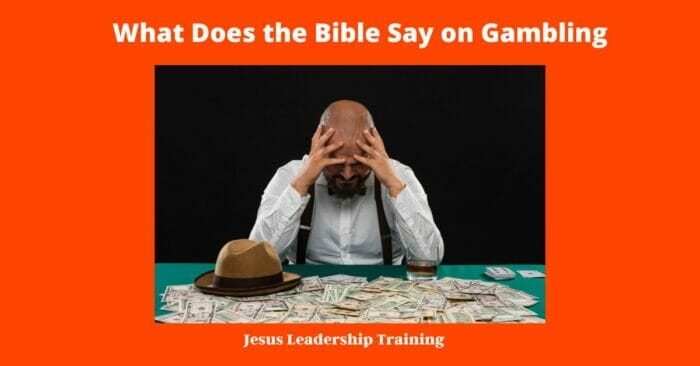What Does the Bible say about Gambling and Lottery KJV – The Bible does not specifically address the issue of gambling, which is why it is important to look at the principles that the Bible does mention in order to determine how we should approach this issue. The Bible does make it clear that our primary focus should be on the stewardship of our resources and the ways in which we choose to use them.
The Bible does not specifically mention gambling or lotteries in the King James Version (KJV). However, it does contain principles and teachings that can be applied to the subject. Here are some Bible verses that provide insights into the general principles related to money, stewardship, and contentment:
- Proverbs 13:11 (KJV)
Wealth gotten by vanity shall be diminished: but he that gathereth by labour shall increase. - Proverbs 28:20 (KJV)
A faithful man shall abound with blessings: but he that maketh haste to be rich shall not be innocent. - 1 Timothy 6:10 (KJV)
For the love of money is the root of all evil: which while some coveted after, they have erred from the faith, and pierced themselves through with many sorrows. - Hebrews 13:5 (KJV)
Let your conversation be without covetousness; and be content with such things as ye have: for he hath said, I will never leave thee, nor forsake thee. - 1 Corinthians 6:12 (KJV)
All things are lawful unto me, but all things are not expedient: all things are lawful for me, but I will not be brought under the power of any. - Matthew 6:24 (KJV)
No man can serve two masters: for either he will hate the one, and love the other; or else he will hold to the one, and despise the other. Ye cannot serve God and mammon.
These verses highlight the importance of being content, avoiding the love of money, and not seeking quick riches. While the Bible doesn’t explicitly address gambling or lotteries, these principles can be applied to financial decisions and the pursuit of wealth.
In its simplest terms, the Bible teaches us that our focus should be on developing fruitful and productive lives, not Harmful Desires.. Gambling, by its very nature, does not align with this teaching, as it involves taking a risk in hopes of reaping a reward. The Bible does not necessarily condemn gambling, but it does contain principles that suggest it may not be wise to engage in this activity. The Bible does warn us of the dangers of greed and of allowing our hearts to become too easily enticed by the prospect of reward at the expense of our resources.
Table of Contents
What Does the Bible say about Gambling and Lottery KJV
The Bible is an ancient collection of manuscripts that is considered one of the most important religious texts in the world. It is the foundation of the Christian faith and provides guidance and wisdom to believers. In addition to providing a foundation for faith, the Bible also contains a great deal of moral instruction concerning behavior, including gambling.
What Does the Bible Say About Gambling?
The Bible does not explicitly state that gambling is a sin; however, it does condemn the love of money and the potential that gambling can lead to dishonesty, greed, and other sinful behavior. The Bible also warns against the casting of lots, which is a form of gambling. Jesus Christ also taught that we should not store up for ourselves earthly treasures, but seek treasures in heaven. Rich Fall into such things as sin.

List of 7 Bible Verses that might reference Gambling
- Proverbs 13:11 – “Wealth gained hastily will dwindle, but whoever gathers little by little will increase it.” This verse speaks about the dangers of trying to get rich too quickly. It suggests that slow, steady, and responsible methods of wealth-building are much better than gambling, which relies upon luck.
- Proverbs 22:3 – “The prudent see danger and take refuge, but the simple keep going and suffer for it.” This verse speaks of the wisdom of avoiding risky activities such as gambling. It warns against the dangers of engaging in activities that can bring harm to oneself.
- Proverbs 21:5 – “The plans of the diligent lead surely to abundance, but everyone who is hasty comes only to poverty.” This verse speaks of the importance of taking the time to think things through and be careful with one’s decisions. It suggests that gambling is a hasty decision that could lead to financial ruin.
- Matthew 6:24 – “No one can serve two masters, for either he will hate the one and love the other, or he will be devoted to the one and despise the other. You cannot serve God and money.” This verse speaks of the dangers of being too focused on money. It suggests that risking money on gambling is not a good way to serve God.
- 1 Timothy 6:10 – “For the love of money is a root of all kinds of evils. It is through this craving that some have wandered away from the faith and pierced themselves with many pangs.” This verse speaks of the dangers of being too focused on money. It suggests that gambling can be a source of temptation that can lead to negative consequences.
- Ecclesiastes 5:10 – “He who loves money will not be satisfied with money, nor he who loves abundance with its income. This also is vanity.” This verse speaks of the dangers of being too focused on money. It suggests that gambling is not a good way to find satisfaction, as it is impossible to win every time.
- Ecclesiastes 5:13 – “There is a grievous evil that I have seen under the sun: riches were kept by their owner to his hurt.” This verse speaks of the dangers of being too focused on money. It suggests that gambling can lead to financial ruin, as it can be difficult to recover from large losses.

Gambling has been around for centuries, and it’s no surprise that it’s found its way into the Bible. It’s an interesting look at the complex relationship between religion and gambling, and how it has changed over the years.
The Bible offers a variety of references to gambling, from the casting of lots to games of chance. In the Old Testament, gambling was seen as a form of divination, used to decide a person’s fate or to cast a judgment. It was believed that the casting of lots was a way to consult God, and that the results were divinely inspired.
The most famous example of gambling in the Bible was the casting of lots to choose the twelfth apostle in the New Testament. According to the Gospel of Luke, the apostles cast lots to determine who would take the place of Judas Iscariot, who had betrayed Jesus. The apostles’ use of gambling to make their decision was seen as a sign of their faith in the divine will.
It’s clear that the Bible has a complicated and varied relationship with gambling. While gambling was sometimes used to make decisions and to divine the future, it was also seen as a warning against the dangers of excessive gambling and its potential to do harm. As times have changed, so too has the way we view gambling, and the Bible’s references to it reflect this.
What Does God Say About Gambling?
God cares about our hearts, and He is concerned with our behavior. He does not want us to be slaves to money or be motivated by greed. God wants us to live our lives in a way that honors Him and brings glory to His name. Gambling can be a way of trying to get something for nothing, and God wants us to be honest and hardworking in our pursuit of wealth and success. He Rewards Work Ethic, and honest work to supply your future needs and also your Neighbor’s House.

Can Gambling Become an Addiction
Gambling is a popular pastime that people have enjoyed for centuries. But, like many other activities, it can become an addiction if it is not managed properly. Gambling addiction can have serious consequences, including loss of financial security, strained relationships, and even mental health issues. But can gambling become an addiction? The answer is yes, and understanding the risks is key to avoiding developing a problem.
Gambling, like any other activity, can become addictive if it is not managed properly. People who are at risk of developing a gambling addiction often have certain personality traits, such as impulsivity, difficulty managing emotions, and an inability to resist temptation. These traits can lead to an individual seeking out gambling activities as a way of dealing with stress or other emotions.
The most common form of gambling addiction is known as compulsive gambling. This is when an individual is unable to control their urge to gamble, despite the negative consequences. Compulsive gamblers often become preoccupied with gambling, and it becomes the main focus of their life. This can lead to feelings of guilt, shame, and depression.
Religious views on gambling vary. In Christianity, gambling is not prohibited, but it is discouraged. The belief is that engaging in gambling activities is a form of idolatry and that it can be a slippery slope towards sin. Other religions, such as Hinduism, also have strict views on gambling, seeing it as a form of temptation that should be avoided.
Historically, gambling has been seen as an activity that was associated with vice and immorality. Throughout history, governments have attempted to regulate gambling to keep it in check, but it has continued to be a popular pastime. In the modern era, however, gambling is viewed differently. It is now seen as a legitimate form of entertainment, and gambling addiction is now recognized as a serious problem.

The best way to prevent gambling addiction is to be aware of the risks and to practice responsible gambling. This includes setting limits on how much money you are willing to gamble, being aware of when you are playing for too long, and seeking help if you feel like you are developing a problem. Gambling addiction is a serious issue and should not be taken lightly. Understanding the risks and taking steps to prevent it is the best way to avoid becoming addicted to gambling.
How Does the Bible View Gambling and Money?
The Bible views money as a tool for good, and it warns against the love of money and the potential for it to become an idol in our lives. Gambling is seen as a form of greed, and it is seen as a way of trying to acquire something without having to work for it. The Bible warns us against the dangers of gambling and money, and it encourages us to be content with what we have and to use the money for good. Excess money can become a difficult issue if it is used to collect the abundance of things rather than the Kingdom of God.
Is Gambling a Sin in the Eyes of the Bible?
Gambling is not explicitly stated as a sin in the Bible, but the Bible does contain warnings about the dangers of gambling. Gambling can lead to a love of money, dishonesty, and greed, which are all viewed as sins in the Bible. The Bible also warns against the casting of lots, which is a form of gambling, and Jesus Christ taught us to seek treasures in heaven rather than on earth.
How Does the Bible View People Who Gamble?
The Bible does not view gambling favorably, and it encourages us to be honest and hardworking in our pursuit of wealth and success. People who gamble are seen as greedy and selfish, and they are warned against the dangers of becoming slaves to money. The Bible also warns us against getting caught up in the thrill of gambling and of allowing it to become an idol in our lives.
Does the Bible Condemn Lottery Tickets?
The Bible does not explicitly condemn lottery tickets, but it does caution against the dangers of gambling and of becoming slaves to money. Lottery tickets are a form of gambling, and the Bible warns us against the potential for dishonesty, greed, and the love of money that can come with gambling. It is best to avoid participating in lotteries altogether, as there is no guarantee of a return.
What Does the Bible Say About Christians and Gambling?
The Bible does not explicitly state that gambling is a sin, but it does warn us against the potential for dishonesty, greed, and the love of money that can come with it. Christians are encouraged to be content with what they have and to use their money for good. Gambling should be avoided, as it is seen as a way of trying to acquire something without having to work for it.
Is the Love of Money Condemned by the Bible?
The love of money is condemned by the Bible, and it is seen as a form of idolatry. The Bible encourages us to be content with what we have and to use our money for good. It warns us against the potential for dishonesty and greed that can come with gambling and of allowing money to become an idol in our lives.
Does the Bible Warn Against Lottery Tickets?
The Bible does not explicitly condemn lottery tickets, but it does warn against the dangers of gambling and of becoming slaves to money. Lottery tickets are a form of gambling, and the Bible cautions us against the potential for dishonesty, greed, and the love of money that can come with it. It is best to avoid participating in lotteries altogether, as there is no guarantee of a return.
Is Gambling the Root of All Kinds of Evil?
Gambling is not the root of all kinds of evil, but it can be a dangerous activity if it is not done responsibly. The Bible warns us against the potential for dishonesty, greed, and the love of money that can come with gambling. It is best to avoid gambling altogether, as it is seen as a way of trying to acquire something without having to work for it.
Are Gambling Addiction and Betting Forbidden by the Bible?
Gambling addiction and betting are not explicitly forbidden by the Bible, but they are seen as dangerous activities that can lead to dishonesty, greed, and the love of money. The Bible encourages us to be content with what we have and to use our money for good. It is best to avoid gambling and betting altogether, as it is seen as a way of trying to acquire something without having to work for it.
What Problems can a Christian Have with Gambling
- Loss of Money: Gambling has the potential to quickly lead to the loss of large amounts of money, which can be detrimental to a Christian’s financial well-being. This can be especially problematic for those who are not as financially secure, such as those living on a fixed income.
- Compulsive Behavior: Gambling can become an addictive and compulsive behavior, which can be difficult to break. This can lead to a Christian neglecting their faith, family, friends, and other responsibilities in order to pursue gambling.
- Temptation to Sin: Gambling can be a temptation to sin, as it can lead to greed and covetousness. Additionally, gambling often involves lying and cheating, which are considered to be sins according to the Bible.
- Conflict with Biblical Principles: The Bible teaches that Christians should not gamble, as it is seen as a waste of money and a form of covetousness. Furthermore, some forms of gambling, such as slot machines, can be seen as a form of idolatry.
- Wastefulness: Gambling involves the risk of losing money, which can be seen as wasteful in the eyes of some Christians. The Bible teaches that money should be used wisely and not wasted.
- Addiction: Gambling can easily become an addiction that leads to obsession and compulsion. This can lead to a Christian spending all of their time and money on gambling, neglecting their faith and other responsibilities.
- Poor Role Model: Gambling can make a Christian a poor role model for others, as it goes against the teachings of the Bible. This can be damaging to their reputation in the eyes of other Christians and can damage their witness.
- Legal Issues: Depending on where a Christian lives, gambling can be illegal. This can lead to legal issues and potential jail time, which is not in line with the teachings of the Bible.
Does the Bible Condemn Slot Machines?
The Bible does not explicitly condemn slot machines, but it does caution against the dangers of gambling and of becoming slaves to money. Slot machines are a form of gambling, and the Bible warns us against the potential for dishonesty, greed, and the love of money that can come with it. It is best to avoid participating in slot machines altogether, as there is no guarantee of a return.
Is Hard Work Valued Above Gambling in the Bible?
The Bible values hard work above gambling, and it encourages us to be content with what we have and to use our money for good. Gambling is seen as a form of greed, and it is seen as a way of trying to acquire something without having to work for it. The Bible warns us against the dangers of gambling and of becoming slaves to money.
Is Casting Lots in the Bible Condemned?
Casting lots is not explicitly condemned in the Bible, but it is seen as a form of gambling and is therefore discouraged. The Bible warns us against the potential for dishonesty, greed, and the love of money that can come with gambling. It is best to avoid casting lots altogether, as there is no guarantee of a return.
Does the Bible View Gambling as a Waste of Money?
The Bible views gambling as a waste of money, and it encourages us to be content with what we have and to use our money for good. Gambling is seen as a way of trying to acquire something without having to work for it, and it can lead to a love of money and the potential for dishonesty and greed.
Does the Bible Say Gambling is the Root of All Evil?
The Bible does not explicitly state that gambling is the root of all evil, but it does warn us against the potential for dishonesty, greed, and the love of money that can come with it. The Bible encourages us to be content with what we have and to use our money for good. Gambling should be avoided, as it is seen as a way of trying to acquire something without having to work for it.
What Does Jesus Christ Say About Gambling?
Jesus Christ taught us to seek treasures in heaven rather than on earth, and He warned us against the potential for dishonesty, greed, and the love of money that can come with gambling. The Bible encourages us to be content with what we have and to use our money for good. Gambling should be avoided, as it is seen as a way of trying to acquire something without having to work for it. The Words of the Lord Jesus are found in the New Testaments. Games of Chance are opposite of Biblical principles and the Needs of the Church.
Is Dishonest Money Condemned by the Bible?
The Bible condemns dishonest money and warns us against the potential for dishonesty, greed, and the love of money that can come with it. Gambling is seen as a form of greed, and it is seen as a way of trying to acquire something without having to work for it. The Bible encourages us to be honest and hardworking in our pursuit of wealth and success.
What Does the Bible Teach Us About Gambling?
The Bible teaches us that gambling is a dangerous activity that can lead to dishonesty, greed, and the love of money. It encourages us to be content with what we have and to use our money for good. Gambling should be avoided, as it is seen as a way of trying to acquire something without having to work for it.
Final Thoughts – What Does the Bible Say on Gambling
The Bible does not explicitly condemn gambling, but it does warn us against the potential for dishonesty, greed, and the love of money that can come with it. The Bible encourages us to be content with what we have and to use our money for good. Gambling should be avoided, as it is seen as a way of trying to acquire something without having to work for it.
Jesus Christ taught us to seek treasures in heaven rather than on earth, and He warned us against the potential for dishonesty, greed, and the love of money that can come with gambling. The Bible also warns us against the casting of lots, which is a form of gambling, and it encourages us to use our money for good and to be honest and
Best Bible Encyclopedias and Dictionaries
Below is a table featuring some highly regarded Bible Encyclopedias and Dictionaries along with their publishers and websites where they can be found or purchased.
| Title | Publisher | Website |
|---|---|---|
| The International Standard Bible Encyclopedia | Eerdmans | Eerdmans |
| Zondervan’s Pictorial Bible Dictionary | Zondervan | Zondervan |
| Easton’s Bible Dictionary | Thomas Nelson | Thomas Nelson |
| Holman Illustrated Bible Dictionary | B&H Publishing Group | B&H Publishing Group |
| The New Unger’s Bible Dictionary | Moody Publishers | Moody Publishers |
| HarperCollins Bible Dictionary | HarperOne | HarperOne |
| Vine’s Complete Expository Dictionary of Old and New Testament Words | Thomas Nelson | Thomas Nelson |
You can generally find these resources on the publishers’ websites, as well as other online book retailers such as Amazon or Christianbook. It’s always good practice to confirm availability and review additional details on the specific websites or other reliable online bookstores.




